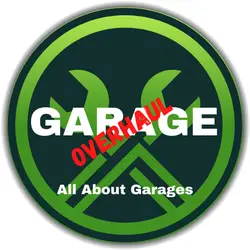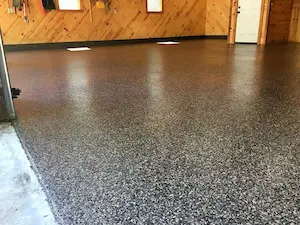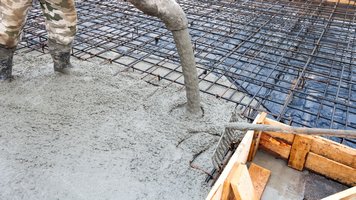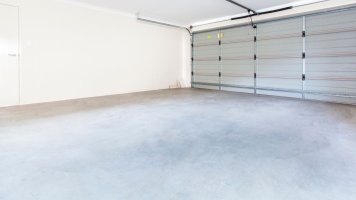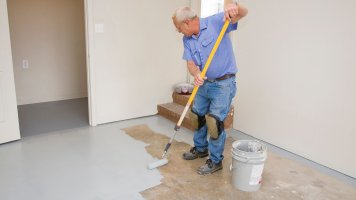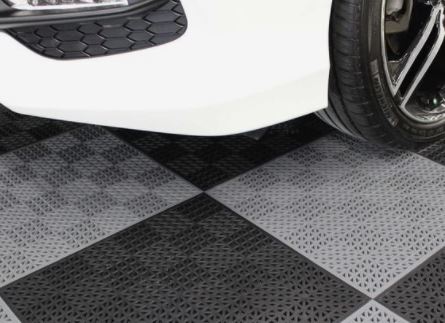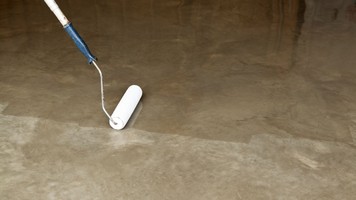Garage Flooring Guide: Tiles (Options, Styles & Installation)
This post contains affiliate links.
There are many types of different tiles suitable for a garage environment. Many are easy to install, and you have a lot of colors available to customize your garage to your liking. Tiles are easy to clean, generally, last a very long time, and are resistant to most chemicals, oil, road salt, water, and mold.
There are interlocking polypropylene & PVC tiles, vinyl composite tiles, rubber tiles, porcelain tiles, and peel & stick tiles available for the garage floors. They come in many sizes & colors and offer easy installation and customization.
In this article, we take a look at different types of tiles suitable for the garage. Materials they are made of and how to install them, and what they cost.
Are Tiles Good for a Garage?
Tiles are an excellent choice for garage floors because they are generally easy to install and offer many perks compared to other suitable options for concrete floors. You can create different patterns easily on your floors, and there are lots of colors available.
Tiles are easy & quick to install. Easy to clean, they are highly customizable and have multiple colors available. They offer slip resistance, are tough, and are resistant to stains, chemicals, oil, grease, salt, water, and mold. Some types can be removed or replaced easily in case one breaks.
Pros and Cons of Garage Floor Tiles
Pros
- Can be installed over cracked or stained floors. Protects the concrete.
- You can create any kind of pattern. Highly customizable.
- Multiple colors are available.
- Easy and quick to install.
- Easy to clean.
- Slip resistance.
- Perforated tiles are also available.
- Tough and lasts a long time.
- Resistant to stains, chemicals, oil, grease, salt, water, and mold.
- Most types can be removed easily.
- Some brands offer extended warranties.
Cons
- Cost. Most tiles are expensive compared to other flooring solutions.
- Moisture can trap underneath the tiles. This can be a problem in regions with cold winters or a lot of rainfall. Your concrete slab also can absorb moisture from the ground.
- Very rigid tiles are only suitable for very flat floors. If you have a drainage slope, this can become a problem.
- One broken interlocked tile can be hard to replace depending on how the tiles are hooked together.
- Plastic garage tiles can buckle when exposed to heat. This is because tiles expand and contract with temperature. A ½” should be left between the tile and any wall. You can also install self-draining tiles at the front of the garage to circumvent the problem.
- If you have serious issues with ground moisture coming through the concrete slab. Avoid any tile that does not “breathe” and won’t allow the surface of the concrete to dry.
Types of Garage Floor Tiles
When we are talking about garage floor tiles, there are many different types available. Materials, size, ease of installation, maintenance, and price varies greatly. Let’s look at all the choices you have for garage floors.
Interlocking Garage Floor Tiles
Interlocking tiles can be disassembled for repeated installations. An average garage can be installed in just a few hours.
Interlocking floor tiles are a good option for garage floors. They are durable and easy to install. Tiles come in sizes from 12×12″ to 24×24″ and ½ to ¾ thickness. There are coin, diamond, free flow, and ribbed surface patterns available. Some tiles also have vinyl inserts that replicate wood flooring patterns or carbon fiber.
Some companies provide online tools so you can design your floor before installing the tiles!
There are multiple colors available. You can mark spaces for car and storage, add borders, and much much more. You can have a custom floor like no other. Premium brands offer warranties for up to 15 years.
Let’s explore the two types of interlocking garage floor tiles below.
Hard Plastic Garage Floor Tiles
Polypropylene tiles are rigid. There are many styles, colors, and options available.
Polypropylene tiles have a hollow-core construction underside with a reinforced grid that makes them very durable. The grid system allows water to drain and air to circulate underneath the tile. This allows the concrete surface to dry and prevents mold or mildew under the tile.
The grid system also acts a little bit like rubber offering anti-fatigue properties.
Interlocking works by peg and loops that snap into place. Assembly is easy with hands or a rubber mallet. The surface of the tile can be solid or have perforation for drainage. Self-draining tiles are a good choice for garages with drains. Water and snowmelt from cars can pass through the tile making them excellent options for winter conditions.
Most surface patterns and textures offer slip resistance. But caution is required with oil spills or ice.
All plastic tiles have ramp edges for garage door and door opening areas. Ramps offer a smooth transition for anything with tires from concrete to the tile.
Hard plastic floor tiles are very strong and can withstand pressure from heavy vehicles, tool boxes, jack stands, and jacks. Most tiles are rated weight loads of 5,000 pounds per square inch and rolling, rating up to 80,000 pounds. The design and quality play a significant role in the weight rating.
Cleaning the tiles is easy, and they are stain, chemical, U.V, oil, grease, salt, dirt, mold, and water-resistant. Installation can be completed in less than a day. Polypropylene tile withstands sub-freezing temperatures and floor temperatures up to 250f or 120c. Direct or radiant heating is not an issue.
Storage racks and cabinets can sit on top of the tiles, and car lifts can be installed and bolted through the tile to the concrete floor.
Drawbacks of Hard Plastic Tiles – When exposed to direct sunlight, the tiles can buckle. This can happen in solid top tiles in south-facing garages when the tiles are exposed to the sun. The plastic tiles expand and contract with the temperature. A ½ gap inch between the tile and walls is required to circumvent the problem. Self-draining tiles can also help when used in the first few rows in front of the garage.
When using jack stands or floor jacks. Make sure to use models with flat-bottom plates. Stands with “L” shaped angled legs can deform and damage the tiles. If you have to use this type of stand, put a piece of plywood under them. Use plywood also with floor jacks.
If you do damage one tile. It is usually easy to replace. This is one advantage of interlocking floor tiles. Remove perforated tiles also when you need to clean fluid spills when necessary.
If the tiles create noise when walking on them. This is usually caused by uneven floors. Use cheap landscape fabric underneath the tiles to absorb the sounds.
Avoid cheap tiles made overseas. Their thickness is usually expressed in millimeters, and they are not usually made thick enough or quality materials.
PVC Garage Floor Tiles
Polyvinyl chloride(PVC) tiles are flexible. It’s dense and rubberlike material. Heavier than rigid plastic tiles. PVC tiles connect to another with a jigsaw-style pattern on the side of the tile. Some manufacturers have a system that hides the jigsaw and what looks like a straight seam between the tiles. The straight seam system is more watertight (not waterproof) than the jigsaw pattern.
PVC tiles do not provide air circulation under the tile. There are only a few manufacturers that offer the option. PVC tiles have a very shallow grid structure under the tile that helps prevent squirm and flex, strengthening the tile.
If you have severe issues with ground moisture coming through the concrete slab, this type of tile is not recommended. As other tiles that do not “breathe.”
Colors and surface patterns for PVC can be limited with some manufacturers. So research the manufacturers if you have a specific color in mind.
PVC tiles are great for workshops and similar usage. They absorb sound and provide anti-fatigue properties. These also come with edge ramps for garage doorways. The ramp is usually a long strip that is cut and fitted.
PVC tiles are super durable. Weight capacity is not an issue, and the weight or wheels of floor jacks, cabinets, toolboxes, car lifts, and similar will not damage the tiles. Only extremely tiny contact points are a problem, like with hard plastic tiles.
PVC tiles are resistant to stain, chemicals, U.V, oil, grease, salt, dirt, mold, and water. Some chemicals, road tar, and dirt can stain if allowed to sit too long.
Thick PVC tiles are used in industrial flooring and warehouses. It performs well with heavy equipment.
Drawbacks of PVC Tiles – Can stain from car tires. Anti-oxidants and polymers can leach from the tires onto the surface of the PCV tile, causing a chemical reaction with the material. Tires can leave a dark yellow or brown tinted tire mark on the surface that won’t come out with any cleaning. This can be avoided with black and dark gray colors under the tires. Tiles can still stain, but they won’t be so noticeable.
For the same reasons, it’s not recommended any liquid or clay-based mud sit for too long on the tile’s surface. They should be cleaned promptly away.
An acrylic coating can be applied on top of the PVC tiles. This way, the issues with stains and tires are removed. The coating will give the tiles a glossy finish too. Most manufacturers have recommended products.
Vinyl Composite Garage Floor Tiles
Vinyl composite (VCT) tiles are also easy to install. This type of tile is used in grocery stores, malls, and schools but is a good choice for garages. VCT tiles are glued to the floor. General size is 12×12 inch and ⅛” thick. Vinyl tiles are resistant to stains, chemicals, salt, and most fluids. Damaged tiles can be replaced, and dulled tiles can be lightly sanded to bring the color back.
VCT durability is great, and it looks excellent, especially in retro garages. It can be installed very cheaply.
These tiles can be slippery when wet and can be damaged by sharp objects. Installation takes time, and the concrete needs to be prepared. Vinyl needs to be waxed regularly. But after waxing, it looks great. Any solvents should be cleaned right away to avoid dulling the wax.
VCT floors are high maintenance. They need to be waxed regularly and mop and scrub them occasionally. Car tires can leave rubbers marks on the surface, and they need to be buffed out. When using jack stands or car jacks, it’s best to place a piece of wood to prevent compression marks.
Manufacturers will not warranty the usage of VCT in garages.
Rubber Garage Floor Tiles
Rubber flooring tiles are made of virgin rubber, synthetic rubber, or recycled rubber.
Rubber tiles are better suited to garage gyms, workshops, and similar usage. They are not really intended to be used under the car. The oils and chemicals can wear and break the clue down that holds the rebonded rubber together and ruin your floor fast.
Vulcanized or virgin rubber can withstand oil and chemicals if you really want rubber floors for car parking.
Rubber is water-resistant and provides traction even when wet. Rubber is very durable and is mold and stain-resistant. Rubber provides excellent cushion, shock absorption, and soundproofing, which is a good choice for workshops. There is low odor recycled rubber available.
Read more about rubber floors in garage mats and rolls article here.
Porcelain Garage Floor Tiles
Porcelain tiles are an excellent choice for a garage floor. They are extremely tough and durable, and many colors, sizes, and surface patterns are available. They can be slip-resistant as well.
Porcelain is easy to clean and resistant to stains, oil, grease, acids, chemicals, and salt. Porcelain works in cold and freezing climates too. Durability is counted in decades. Porcelain tiles are often used in showrooms, malls, and mechanic garages because they are durable and easy to maintain.
Porcelain is extremely hard to break, scratch or chip. If you manage to break one tile by dropping an engine block or something weighty on it. You can just simply replace the damaged section.
Porcelain tiles are rated in three different categories:
- Hardness – Referred to as PEI scale. It determines the tile’s durability in terms of how the surface can handle abrasion and traffic before showing any wear or tear. For garages, you want a rating of 4 or 5 on the PEI scale. 4 is for medium commercial usage, and 5 is for heavy commercial use.
- Slip Resistance – Slip resistance is measured as COF (coefficient of friction) on wet surfaces. A tile that is rated at 0.60 or greater is considered slip-resistant. Rating of 0.50-0.59 is considered conditionally slip-resistant. Tiles rated under 0.50 are considered questionable for slip resistance.
A new DCOF rating for porcelain tiles states that when walked wet, tiles must meet a minimum wet DCOF acutest value of 0.42. surfaces with a DCOF of .42 or higher are generally considered slip-resistant
- Moisture – To be certified as porcelain tile, it must be rated at or below 0.5% for moisture. That rating is considered impervious to water. This is what makes the tile frost, water, and stain-proof.
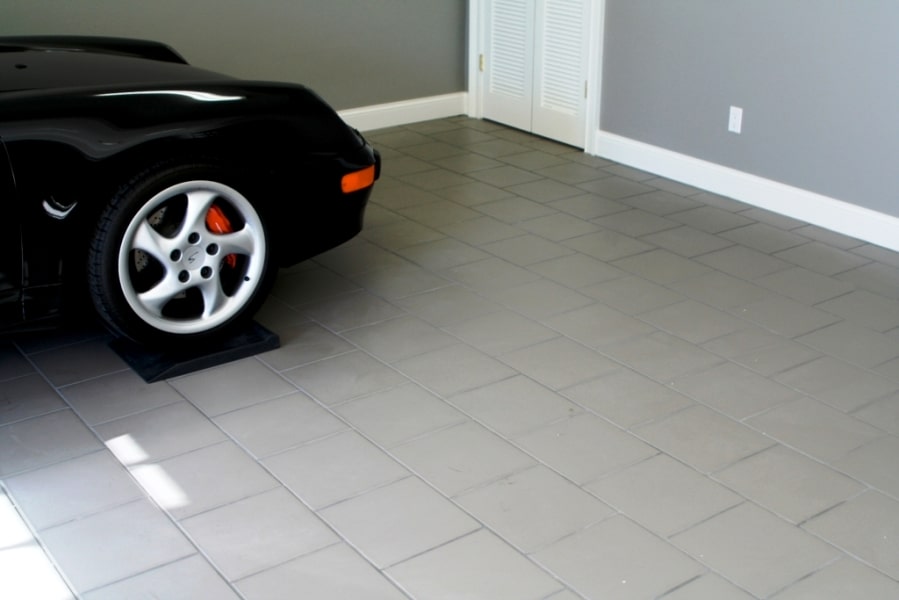
Installation is not easy, though, and needs a professional.
If you DIY. When laying an individual tile, apply the mortar to both the concrete floor and back of the tile before setting it. This way, you ensure that there are no air pockets under the tile. Also, make sure all tiles are level with each other, and there are no raised edges. Use small grout lines of 3/16″ or less for easy rolling of creepers, jacks, and toolboxes.
Porcelain has an absorption rate of less than .05%, so it will not absorb water in freezing conditions. If you live in an area where winters get below freezing and the garage is not heated or insulated, follow a couple of requirements. Add latex additive to the mortar. It makes the mortar more flexible and able to withstand the freeze/thaw cycles. Also, seal the grouts or use grouts that do not require a sealer. This prevents water or snowmelt from seeping underneath the tile and popping off when the water freezes. It also prevents stains in the grout.
Design tip. Match tile size to the size of the space – smaller tiles for smaller spaces and larger tiles for larger areas. Example. One car garage: limit the size to 12×12″ Smaller tile size creates the visual effect of making a small room appear larger. For larger garages like 3 cars, you can use 12×24 or 24×24 tiles.
Peel and Stick Vinyl Garage Floor Tiles
Peel and stick tiles are made usually from polyvinyl and installed just like the name says. Most have pressure-sensitive adhesive on the back. The adhesive is exposed by peeling the release paper on the back of the tile. Quality tiles are tough and resistant to chemicals, oil, road salt, dirt, and water. Most have anti-slip properties with different surface patterns and absorb sound. There are many styles and colors available.
These tiles are non-porous, easy to clean, and usually have a glossy finish. With different surface patterns like diamond and do not require any waxing or similar treatment.
Installation requires that the concrete is cleaned correctly to allow bonding.
Peel and stick tiles can be spun loose if you turn the front wheels when not moving. You can avoid this by making the vehicle move even a little bit at the same time when turning the wheels.
Spillovers from liquids and chemicals should be cleaned right away to avoid them from staining the tiles.
Tile edges can lift if the floor is not cleaned properly before installation. The tile edges can be glued back with some spray-on glue applied to the underside of the edge.
Polyvinyl peel and stick tiles can be susceptible to tire marks. Usage of dark colors is suggested under the tires to avoid the problem. Some sealers can also be applied on top of the tiles giving it an extra glossy finish.
Are Garage Floor Tiles Slippery When Wet?
Only very smooth surfaces can be slippery when wet. Still, most types of garage floor tiles already have a good slip resistance because of the different surface patterns. Most materials themselves offer anti-slip protection also.
Smooth porcelain can be slippery. So purchase a tile with a high COF (coefficient of friction) rating. Tile rated between .055 and .059 is equivalent to bare wet concrete. A rating above .060 is considered slip-resistant and meets or exceeds ADA and OSHA requirements for a wet surface.
Slip resistance is measured as COF (coefficient of friction) on wet surfaces. A tile that is rated at 0.60 or greater is considered slip-resistant. Rating of 0.50-0.59 is considered conditionally slip-resistant. Tiles rated under 0.50 are considered questionable for slip resistance.
A new DCOF rating for porcelain tiles states that when walked wet, tiles must meet a minimum wet DCOF acutest value of 0.42. surfaces with a DCOF of .42 or higher are generally considered slip-resistant.
Does Welding Damage Garage Floor Tiles?
Welding will damage any surface, including concrete. Always use a welding blanket to avoid small burn marks on your garage floor surface. Cutting torches will damage the floor also. Avoid small sharp metal objects too. They will gouge and scar the tiles when dragged across any surface.
Read here how to do welding in the garage safely.
Does Water Get Under Garage Floor Tiles?
Most tiles are watertight but not waterproof. Meaning some small amounts of water can pass through the joints.
This depends on the type of tile used and the conditions of your region. If you have issues with moisture coming through the concrete, you should get tiles with good air circulation.
Most solid-top tiles with interlocking are not watertight, and fluids can pass between the joints. However, the surface tension (especially water) created by fluids will reduce the amount dramatically of liquid that gets through.
Some tiles are perforated to allow drainage to the garage drain if you have one.
Porcelain tiles can be sealed at the grout.
Polypropylene tiles have a hollow core underside that reinforces the tile and allows the air to circulate and water to drain.
How to Clean Garage Floor Tiles
Garage floor tiles can be cleaned with almost any cleaning agent and mopping and hose. You can vacuum or brush them also.
Read here how to properly clean the whole garage.
How to Install Garage Floor Tiles
Interlocking tiles are easy to install because they are free-floating designs. Meaning they sit on top of the floor with nothing to affix them to. So cleaning the garage floor is usually enough. Surface cracks and other damage to the concrete do not need to be fixed.
Usually, the first row of tiles is assembled to the garage door entrance. The second attached row goes up one side of a wall forming an “L” shape.
If you have a side door to the garage, it’s best to plan the layout by considering that door. You want to use edge ramps for that entrance, too, besides the main garage door. Remember to leave at least a ½ inch gap between the tiles and the wall or permanent structures.
Installation for Interlocking Tiles
Installation for Vinyl Composition Tiles
Installation for Peel and Stick Tiles
Porcelain Tiles require a professional installation or skilled DIY. Check the installation video in the porcelain tile section of the article.
How Much Does It Cost to Tile a Garage Floor?
Garage floor tiles can be expensive compared to other flooring solutions.
Tile prices generally start around $2.50 per square foot and go higher depending on the tile type.
Interlocking Rigid polypropylene starts at $2 per square foot and over $3 for PVC tiles. Professional Interlocking garage floor tile installation costs are around $2 per square foot (polypropylene tile) and over $3 per square foot (PVC tile).
Vinyl composite(VCT) tiles start at 80 cents per square foot.
Rubber Tiles start at $3-$8 per square foot.
Peel and sticks tiles cost is around $3 per square foot
Porcelain tiles start as low as $1 per square foot and go to $5 per square foot.
But quality porcelain tiles should be used in the garage. You want a rating of 4 or 5 on the PEI scale for garages. 4 is for medium commercial use, and 5 is for heavy commercial use. There is also the cost of supplies such as grout, mortar, trowels, and other tools you need for installation.
Porcelain/Ceramic Tile Installation Costs Per Square Foot
Source homeadvisor.com
| Item | Per Square Foot |
|---|---|
| Tile | $0.50 – $15 indoor $1 – $35 outdoor |
| Labor | $4 – $32 |
| Other Materials | $6 – $9 |
| Removal of Old Surface | $2 |
| Preparing Area | $1 – $5 |
| Total | $13.50 – $63 indoor $14 – $83 outdoor |
Tiles are generally more expensive than garage floor epoxy, mats, sealing, or paint.
How Long Do Garage Floor Tiles Last?
This depends very much on the type of tile used and depends heavily on the usage of the floor and other conditions. Is there heavy traffic or light over the years? Are the floors maintained regularly, and what do you or mother nature throw at them. Let’s look at some average lifetimes. Some manufacturers offer warranties for up to 15 years.
- Polypropylene – 5-15 years.
- PVC – 5-15 years.
- Vinyl composite – 10-15 years ( Manufacturers will not warranty the usage of VCT in garages)
- Rubber – Can last 20 years.
- Porcelain – Lasts decades.
- Peel and stick – 5-25 years.
Check also the other garage flooring articles.
